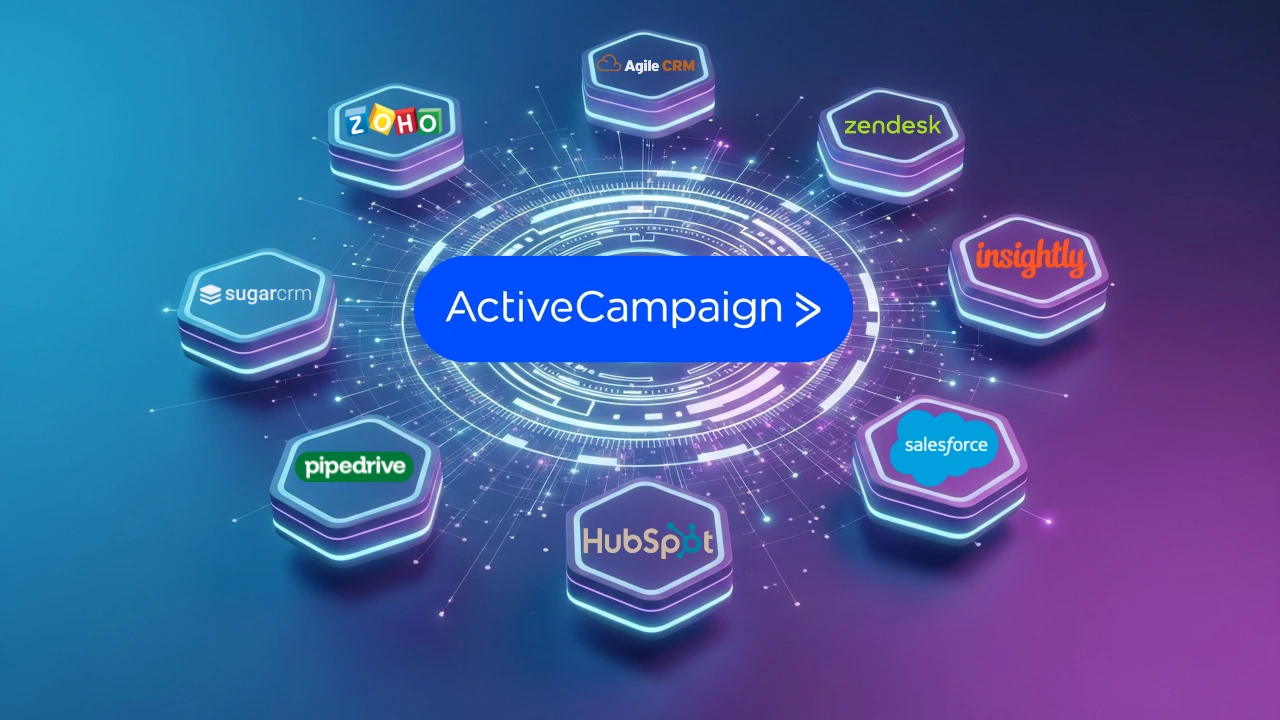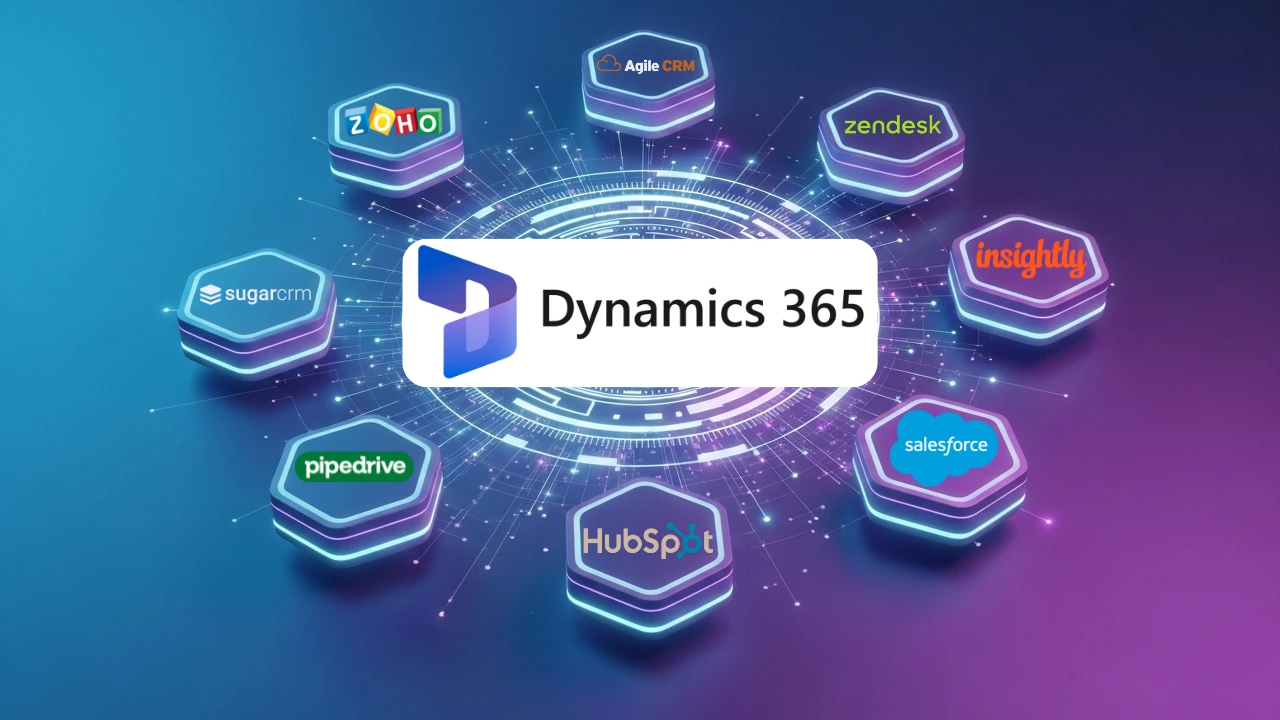•
Best Zoho CRM Alternatives: Expert Platform Analysis
October 16, 2025
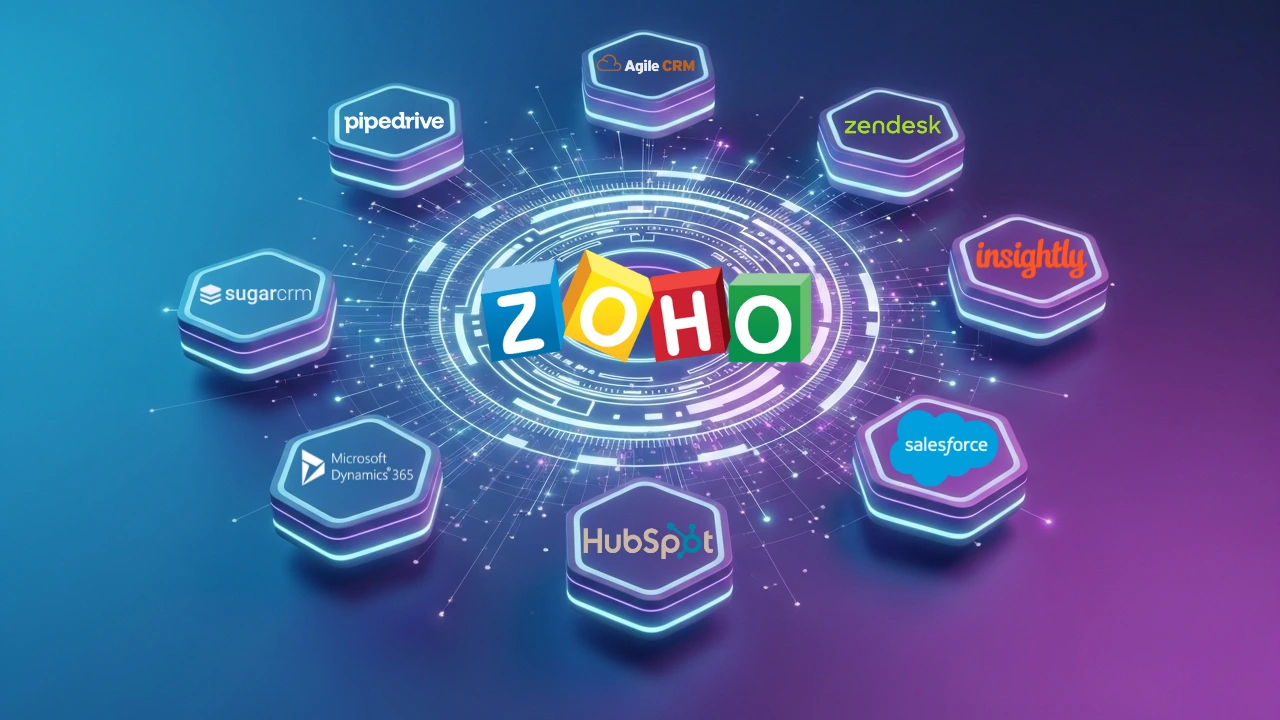
Quick Comparison Summary
Zoho CRM offers comprehensive features at competitive prices but requires more training time and works best within the Zoho ecosystem. HubSpot wins for growing businesses that need integrated marketing and sales in one platform with straightforward pricing. Pipedrive excels for sales-focused teams wanting visual pipeline management without complexity. Salesforce serves enterprises requiring unlimited customization and advanced features. Microsoft Dynamics 365 works best for organizations already invested in the Microsoft ecosystem. Still unsure which platform fits your specific needs? Read our detailed comparison below or contact Capital S Consulting for expert guidance.
Zoho CRM provides solid customer relationship management capabilities at competitive prices. Developed by Zoho Corporation, the platform offers contact management, sales pipeline tracking, workflow automation, and email marketing in a single CRM software solution. As part of the broader Zoho Suite including Zoho One, Zoho Projects, Zoho Books, and Zoho Desk, it integrates with various business applications. However, organizations often seek alternatives when they need more intuitive user interfaces, better third-party integrations, stronger customer support, or more advanced features for scaling operations.
Teams struggle with Zoho's learning curve, need stronger integrations with project management tools or help desk software, or require more sophisticated workflow automation and business intelligence than Zoho provides. Organizations comparing Google Workspace integration or Microsoft 365 connectivity often find alternatives offer smoother implementations and better omnichannel support.
This analysis examines leading Zoho CRM alternatives across implementation complexity, feature value per dollar, scalability options, and integration ecosystems. Whether you need better sales pipelines, enhanced customer communication, or comprehensive business intelligence, this comparison helps identify which CRM software best matches your requirements.
Key Takeaways Quick Summary
Who each platform fits: HubSpot serves businesses prioritizing marketing-sales alignment with integrated email marketing; Salesforce fits enterprises needing deep customization; Pipedrive works for sales teams wanting simplicity; Microsoft Dynamics 365 suits organizations in the Microsoft ecosystem requiring customer service and business intelligence
Time-to-value insights: Pipedrive and HubSpot typically achieve user adoption within days to weeks. Salesforce and Microsoft Dynamics 365 require weeks to months depending on customization requirements and workflow automation complexity.
TCO considerations: Entry-level pricing varies significantly, but total cost includes integration expenses, customization work, training time, and feature limitations at lower tiers. Enterprise features require substantial investment in higher-tier plans with advanced workflow automation and business intelligence tools.
Implementation Complexity: User adoption rates depend on user interface intuitiveness, training requirements, and configuration speed. Identity and access management configuration, custom field setup, and workflow automation rules all impact implementation timelines.
Feature Value per Dollar: Some platforms bundle essential features like email marketing, workflow automation, and reporting at lower price points. Others reserve functionality like Gantt charts, kanban boards, or advanced customer support tools for premium tiers. Integration with project management software, help desk systems, and knowledge base tools affects overall value.
Scalability and Customization: Growth adaptation includes custom field creation, workflow flexibility, advanced reporting, and handling increasing data volumes. Platforms differ in how much you can customize contact management, sales pipelines, and business processes without developer resources.
Integration Ecosystem: No-code integrations allow teams to connect email marketing tools, project management software like Planview AdaptiveWork, customer support platforms like Help Scout, and business applications without technical expertise. Knowledge management connectivity ensures customer information flows between systems. API documentation quality affects implementation timeline and total cost of ownership.
Quick Summary
Cost-effective pricing | Part of Zoho Suite ecosystem | Extensive features across tiers | Steeper learning curve
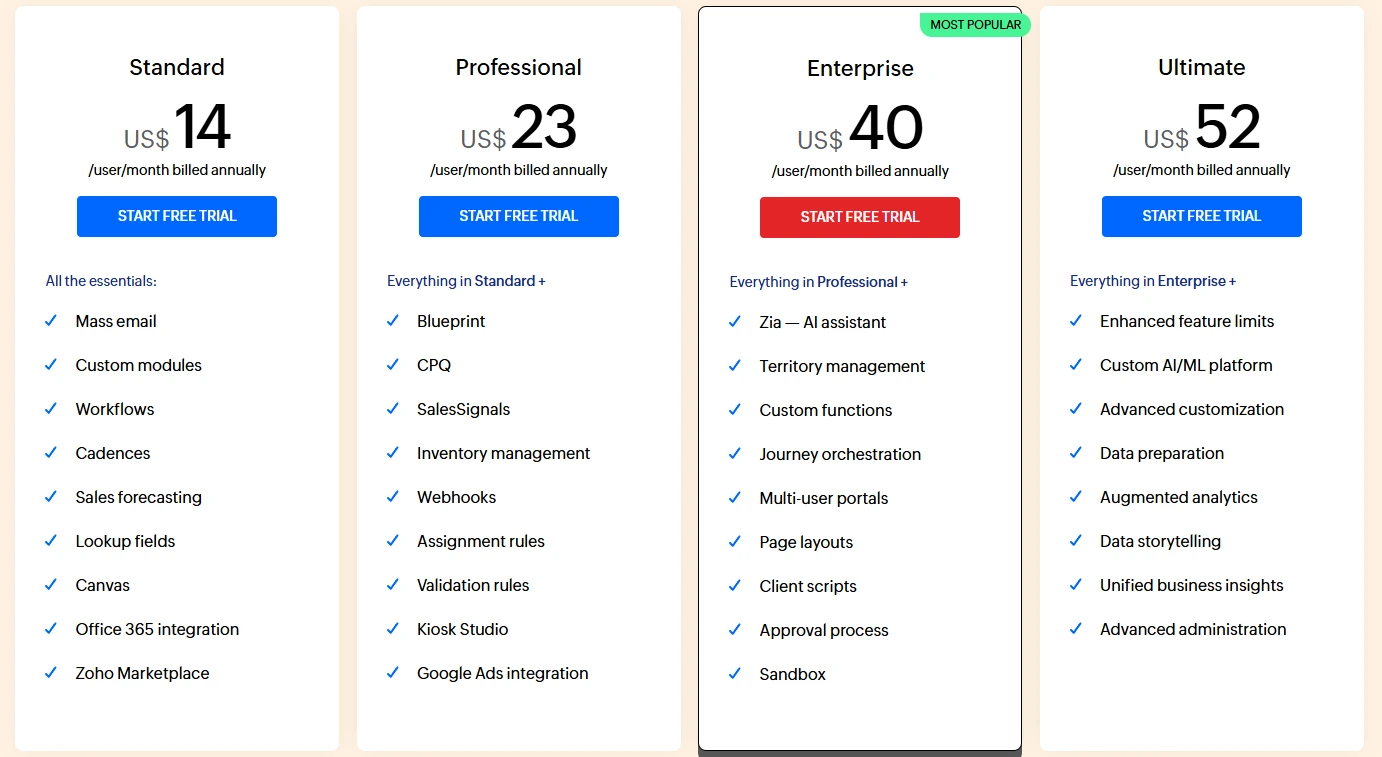
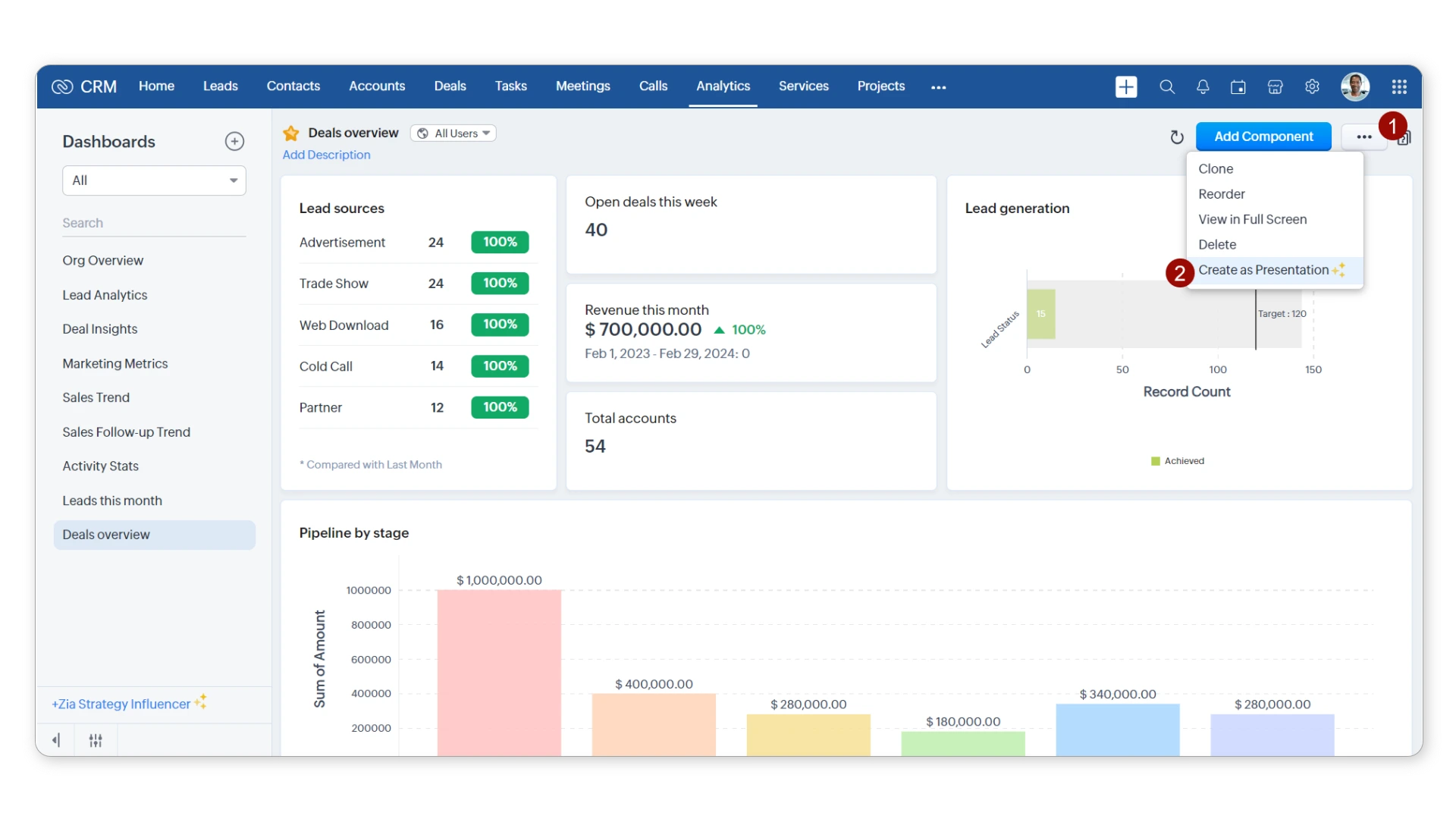
Zoho CRM, developed by Zoho Corporation, provides comprehensive customer relationship management as part of the broader Zoho Suite including Zoho One, Zoho Projects, Zoho Books, Zoho Desk, and other Zoho products. The platform offers contact management, sales pipeline tracking, workflow automation, and email marketing at competitive price points. Organizations choose Zoho CRM when budget is a primary concern and they want extensive features without premium pricing.
Key Features
Zoho CRM includes sales pipeline management with customizable stages, workflow automation for routine tasks, email marketing integration, and AI assistant capabilities called Zia. The platform offers multichannel communication tracking, knowledge base integration with Zoho Desk, project management connections to Zoho Projects, and business intelligence through Zoho Analytics. Contact management handles customer interactions across sales activities, while canvas design studio allows interface customization. The system integrates with other Zoho products including Zoho Books for invoicing, Zoho Inventory for stock management, and Zoho Sheet for data processing.
Pricing Structure
Standard: $14/user per month (annually)
Professional: $23/user per month (annually)
Enterprise: $40/user per month (annually)
Ultimate: $52/user per month (annually)
Pricing verified October 2025, subject to change.
Our Take
Zoho CRM delivers strong value for cost-conscious organizations needing comprehensive CRM software without premium pricing. The platform offers extensive features across tiers that competitors often reserve for higher plans. Integration with the Zoho Suite provides connections to project management through Zoho Projects, customer service through Zoho Desk, and other business applications. However, the user interface presents a steeper learning curve compared to alternatives like Pipedrive or HubSpot. Organizations seeking rapid user adoption, more intuitive kanban boards, superior workflow automation, or better integration with non-Zoho tools often explore alternatives. The platform works well for businesses committed to the Zoho ecosystem and willing to invest time in training, but may frustrate teams wanting immediate productivity or seamless connections to Microsoft 365, Google Workspace, or specialized project management software and help desk systems.
Quick Summary
Marketing-sales powerhouse | Extensive native integrations | Advanced features in higher tiers | Pricing increases with scale


HubSpot positions itself as a unified platform combining customer relationship management with integrated communication tools. The platform emphasizes multichannel communication and customer engagement while maintaining competitive pricing. What sets HubSpot apart is its comprehensive approach offering web forms for lead generation, email marketing, and advanced reporting and analytics in a single solution.
Key Features
Native email campaigns, email sequences, and marketing automation eliminate separate email marketing tools. Lead management flows naturally from marketing campaigns through sales pipelines to customer service interactions. Visual pipeline management with customizable stages helps sales teams track customer engagement and forecast pipeline health. Built-in analytics provide insights into sales performance tracking without requiring separate business intelligence tools. Service Hub includes help desk functionality with ticket assignment, knowledge base creation, and omnichannel support. The platform offers a functional free tier for testing before committing to paid plans.
Pricing Structure
Free: $0 (with limitations)
Starter: $15/user per month (annually)
Professional: $100/user per month (annually)
Enterprise: $150/user per month (annually)
Pricing verified October 2025, subject to change. Annual billing includes discounts.
Our Take
HubSpot stands out for organizations wanting to consolidate their sales and marketing technology stack when rapid user adoption is critical. From a CRM implementation perspective, teams typically achieve productivity within 2-3 weeks. The integrated approach to customer engagement, email marketing, and workflow automation eliminates multiple tools that Zoho One users might otherwise require. However, pricing escalates quickly as you add users and advanced features. For growing businesses needing integrated marketing capabilities, customer support tools, and straightforward user adoption, HubSpot often delivers faster time-to-value than more complex alternatives.
Quick Summary
Enterprise-grade customization | Largest app ecosystem | Requires significant setup | Premium pricing at scale
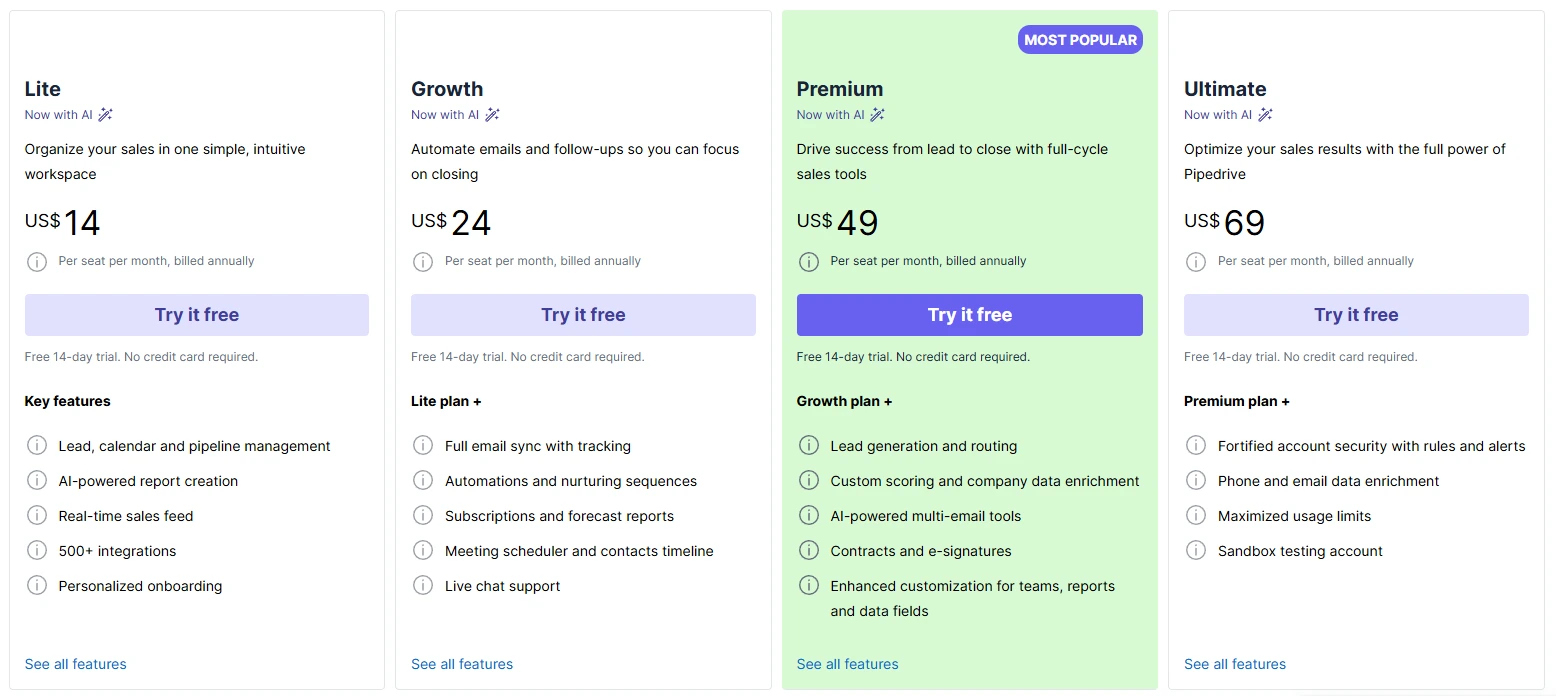
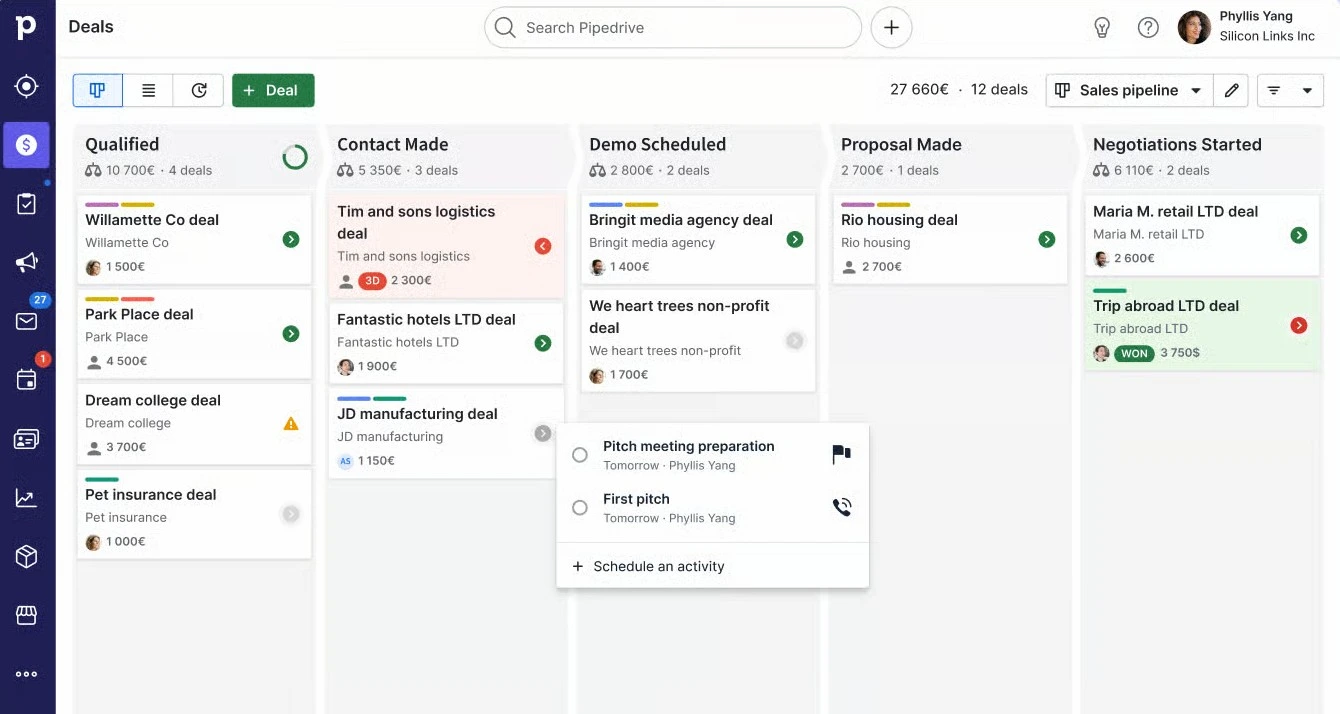
Salesforce provides enterprise-grade customer relationship management with deep integration into a vast ecosystem through the Salesforce Platform. The platform offers unlimited customization potential through its development environment. Organizations choose Salesforce when they need to configure every aspect of their sales processes from custom objects to complex workflow automation. The system integrates with project management software, help desk solutions, and business intelligence tools through extensive API documentation.
Key Features
Custom fields, objects, page layouts, and business logic allow organizations to build precisely the customer relationship management system they need. The AppExchange ecosystem provides over 4,000 pre-built applications extending capabilities across project management, email marketing, customer support, and applicant tracking systems. Advanced automation through Process Builder and Flow enables sophisticated workflows and AI automation. Einstein Analytics provides comprehensive business intelligence capabilities. Service Cloud delivers omnichannel support with case management, knowledge base, and multichannel functionality. The underlying Salesforce Platform supports custom application development beyond traditional CRM functionality.
Pricing Structure
Essentials: $25/user per month (annually)
Professional: $80/user per month (annually)
Enterprise: $165/user per month (annually)
Unlimited: $330/user per month (annually)
Pricing verified October 2025, subject to change.
Our Take
Salesforce works best for enterprises needing comprehensive customer relationship management with advanced customization capabilities. From our CRM implementation experience, the platform provides exceptional value when organizations can leverage existing technical resources and require extensive workflow automation. The system handles complex requirements that might need multiple Zoho products including Zoho Projects, Zoho Desk, and other tools. However, the complexity requires significant implementation planning, identity and access management configuration, and user training. For large organizations wanting unlimited flexibility through the Salesforce Platform, it often provides superior workflow automation and business intelligence capabilities.
Quick Summary
Visual pipeline focus | Quick implementation | Limited marketing features | Competitive pricing for sales teams


Pipedrive focuses specifically on sales pipeline management with a user interface designed around visual deal progression. The platform prioritizes simplicity and user adoption over comprehensive features. Sales teams track deals through customizable stages with kanban boards and drag-and-drop functionality, making it effective for organizations transitioning from spreadsheets or seeking to improve sales processes without overwhelming users.
Key Features
Kanban-style interface provides clear visibility into deal progression with drag-and-drop prioritization. The platform emphasizes activity-based selling with task management and automated follow-ups ensuring sales pipelines move forward through consistent customer interactions. Two-way email synchronization tracks all customer communication within contact records. Comprehensive mobile apps maintain full functionality for field sales teams. Sales automation streamlines repetitive tasks including email campaigns and deal updates, though advanced automation requires higher-tier plans.
Pricing Structure
Essential: $14/user per month (annually)
Advanced: $29/user per month (annually)
Professional: $59/user per month (annually)
Enterprise: $99/user per month (annually)
Pricing verified October 2025, subject to change.
Our Take
Pipedrive delivers exceptional value for sales-focused organizations that prioritize user adoption and pipeline visibility. From implementation experience, teams typically master Pipedrive's core functions within hours, making it excellent for organizations prioritizing rapid user adoption. The visual sales pipeline using kanban boards provides immediate clarity that competing platforms often require extensive configuration to achieve. However, businesses needing extensive marketing automation, customer service integration like Zoho Desk, project management tools, or complex workflow automation will likely outgrow the platform. For companies where sales pipeline management is the primary requirement, Pipedrive often provides better user engagement than more feature-heavy alternatives.
Quick Summary
Deep Microsoft integration | Advanced AI capabilities | Complex setup requirements | Enterprise pricing model

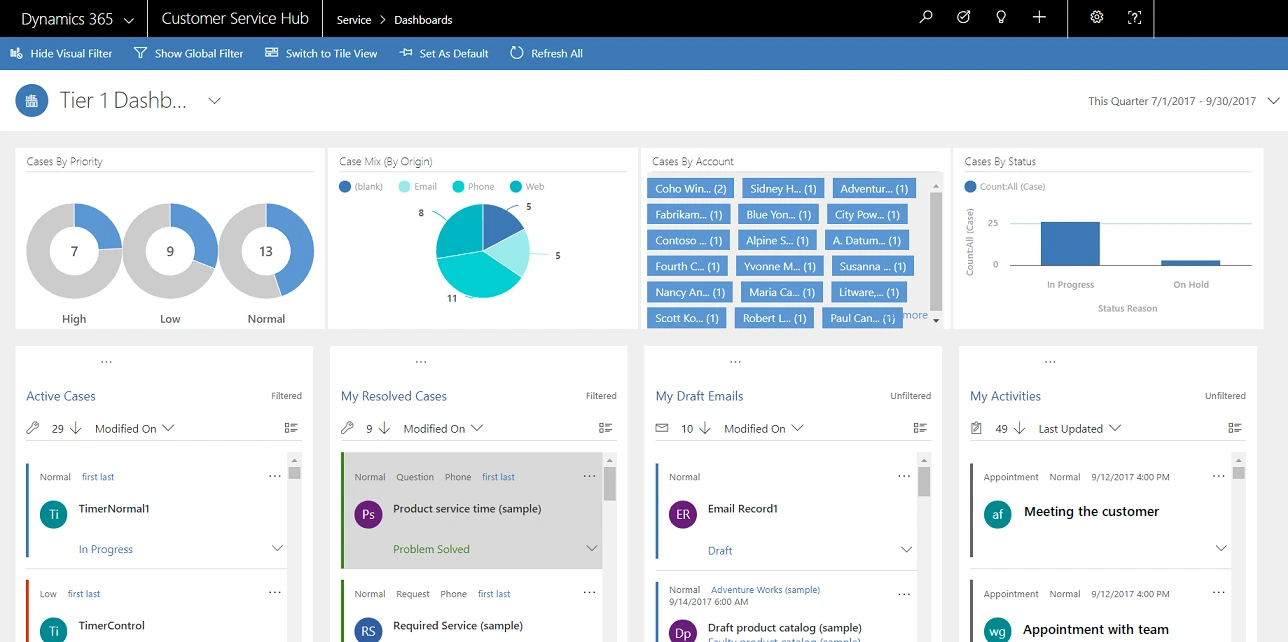
Microsoft Dynamics 365 provides enterprise-grade customer relationship management with native integration into the Microsoft ecosystem including Microsoft 365, Teams, and Azure. The platform combines sales, customer service, and marketing capabilities with advanced AI features and comprehensive business intelligence tools through Power BI. Organizations already using Office 365 and Teams find natural workflow connections that reduce training requirements.
Key Features
Seamless connectivity with Microsoft 365, Office 365, Teams, and Azure creates natural workflow for organizations already using Microsoft tools. AI-powered insights provide predictive analytics, automated data entry, and intelligent customer service recommendations. Customer service and field service modules extend beyond traditional sales functionality, managing complete customer lifecycles. Power Platform integration through Power Apps allows custom application development without traditional coding. Enterprise security features include identity and access management and deployment options including cloud, on-premises, and hybrid configurations. Deep Power BI integration provides advanced business intelligence, data processing, and comprehensive analytics.
Pricing Structure
Sales Professional: $65/user per month (annually)
Sales Enterprise: $95/user per month (annually)
Sales Premium: $135/user per month (annually)
Pricing verified October 2025, subject to change.
Our Take
Microsoft Dynamics 365 works best for enterprises already invested in the Microsoft ecosystem that need comprehensive customer relationship management with advanced AI capabilities and business intelligence. From implementation experience with enterprise systems, the platform provides exceptional value when organizations can leverage existing Microsoft licenses and infrastructure. The native integration with Teams, Outlook, and Microsoft communication tools creates seamless customer communication that organizations using Google Workspace cannot easily replicate. However, the complexity rivals Salesforce, requiring significant implementation planning and user training. For large organizations wanting enterprise-grade customer service with help desk functionality, ticket assignment, omnichannel support, predictive analytics through AI automation, and comprehensive business intelligence within their Microsoft environment, Dynamics 365 often provides superior workflow automation capabilities.
Pipeline Management
Winner: Salesforce - Most comprehensive
Zoho CRM provides customizable sales pipeline stages with visual tracking, though the interface requires more configuration than competitors. The platform handles multiple pipelines and forecasting but lacks the visual simplicity of alternatives.
HubSpot provides excellent visual pipeline design with customizable stages. Salesforce offers unlimited pipeline customization with multiple pipeline types and complex forecasting models through the Salesforce Platform. Pipedrive excels at visual simplicity with kanban boards and drag-and-drop prioritization. Microsoft Dynamics 365 provides enterprise pipeline features with AI-powered predictions and business intelligence.
Winner: Salesforce - The unlimited customization through the Salesforce Platform and enterprise forecasting capabilities make it the most comprehensive solution.
Sales Automation and Email Follow-up
Winner: HubSpot - Best integrated approach
Zoho CRM offers workflow automation and email marketing through Zoho Campaigns integration. The automation capabilities exist but require more setup than competitors, and email sequences lack the sophistication of dedicated email marketing platforms.
HubSpot combines email marketing automation, email sequences, and sales automation in a unified platform. Salesforce provides advanced automation through Process Builder and Flow with AI automation capabilities. Pipedrive offers basic workflow automation for routine sales tasks. Microsoft Dynamics 365 delivers enterprise-level automation with AI-enhanced recommendations.
Winner: HubSpot - The integration of marketing automation, email sequences, and workflow automation in an accessible user interface makes it the strongest choice for comprehensive automation.
Communication Tools
Winner: Microsoft Dynamics 365 - Deepest integration
HubSpot integrates email, meeting scheduling, and communication tracking with automatic logging. Salesforce offers multi-channel communication support with Einstein Activity Capture. Pipedrive focuses on email integration with automatic activity logging. Microsoft Dynamics 365 provides deep integration with Teams, Outlook, and Microsoft 365 tools with multichannel functionality and omnichannel support.
Winner: Microsoft Dynamics 365 - For organizations using Microsoft tools, the native integration provides the smoothest experience and most comprehensive customer communication tracking.
Lead Generation and Web Forms
Winner: HubSpot - Built-in lead capture
HubSpot includes native web form builders, landing pages, and lead capture tools at all pricing tiers. Salesforce offers lead capture through Web-to-Lead forms and integrations. Pipedrive provides basic web form functionality through integrations. Microsoft Dynamics 365 includes lead management features requiring separate licensing.
Winner: HubSpot - The built-in lead generation tools provide the most comprehensive lead capture without additional costs.
Customization and Integration Options
Winner: Salesforce - Unlimited flexibility
HubSpot offers a broad ecosystem through its App Marketplace. Salesforce delivers unlimited customization through the Salesforce Platform with the largest third-party integration ecosystem including project management, applicant tracking systems, and help desk software. Pipedrive maintains a growing marketplace covering essential business tools. Microsoft Dynamics 365 enables deep customization through the Power Platform.
Winner: Salesforce - The unlimited customization potential and largest integration ecosystem make it the clear winner for extensive flexibility and no-code integrations.
User Interface and Learning Curve
Winner: Pipedrive - Cleanest, simplest design
HubSpot balances comprehensive features with an intuitive user interface. Salesforce presents a complex user interface with a steep learning curve. Pipedrive prioritizes simplicity with a clean, focused interface centered on kanban boards. Microsoft Dynamics 365 presents an enterprise-focused interface assuming Microsoft familiarity.
Winner: Pipedrive - The focused, intuitive user interface and minimal learning curve make it the easiest platform for teams to adopt.
Reporting and Analytics
Winner: Salesforce - Most advanced capabilities
HubSpot provides good marketing-sales insights with customizable dashboards. Salesforce delivers comprehensive reporting with Einstein Analytics for advanced business intelligence. Pipedrive offers basic sales reporting focused on pipeline health. Microsoft Dynamics 365 provides advanced reporting through Power BI integration.
Winner: Salesforce - The depth of reporting customization, Einstein Analytics, and comprehensive business intelligence tools make it the most advanced platform.
Customer Service and Ticketing
Winner: Microsoft Dynamics 365 - Enterprise service management
HubSpot includes Service Hub with ticketing, ticket assignment, and knowledge base creation. Salesforce offers Service Cloud with comprehensive customer support including omnichannel support and knowledge base. Pipedrive provides limited native customer service features. Microsoft Dynamics 365 delivers enterprise customer service management with case routing, ticket assignment, knowledge management, and omnichannel support.
Winner: Microsoft Dynamics 365 - The comprehensive customer service functionality with help desk capabilities, sophisticated ticket assignment, and field service modules make it the strongest choice for integrated customer support.
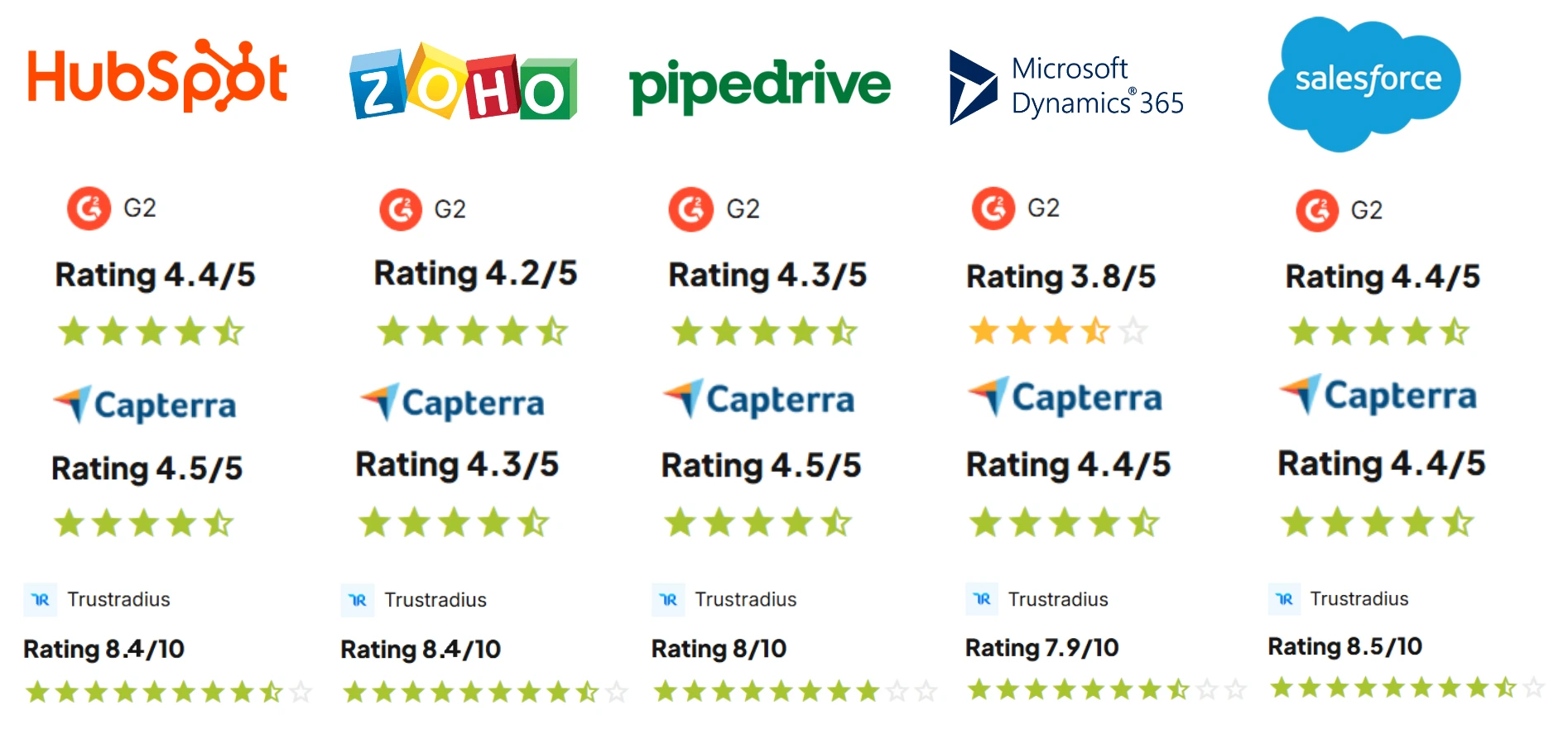
Zoho CRM
G2: 4.2/5 based on 2,500+ reviews
Capterra: 4.3/5 based on 6,500+ reviews
TrustRadius: 8.4/10
Users appreciate the affordable pricing and feature breadth. One reviewer noted: "Great value for the price with lots of capabilities." However, the user interface receives mixed feedback: "Powerful but takes time to learn and configure properly."
HubSpot CRM
G2: 4.4/5 based on 12,000+ reviews
Capterra: 4.5/5 based on 4,400+ reviews
TrustRadius: 8.4/10
Users praise the ease of use and integrated marketing capabilities. One G2 reviewer stated: "Everything in one place makes our workflow smoother." Pricing concerns appear frequently: "Costs escalate quickly as you grow."
Salesforce
G2: 4.4/5 based on 20,000+ reviews
Capterra: 4.4/5 based on 18,000+ reviews
TrustRadius: 8.5/10
Users appreciate the customization potential. A reviewer noted: "Configure Salesforce to do absolutely anything." Complexity is a common concern: "Requires significant expertise to implement properly."
Pipedrive
G2: 4.3/5 based on 2,700+ reviews
Capterra: 4.5/5 based on 3,000+ reviews
TrustRadius: 8/10
Users highlight the intuitive interface. One reviewer stated: "Up and running in days, not weeks." Limitations emerge: "Great for pipeline tracking but lacks marketing features."
Microsoft Dynamics 365
G2: 3.8/5 based on 1,400+ reviews
Capterra: 4.4/5 based on 5,100+ reviews
TrustRadius: 7.9/10
Users value the Microsoft integration: "Seamless workflow with Office tools." Implementation complexity appears frequently: "Requires significant setup time and technical expertise."
Ratings pulled from G2, Capterra, and TrustRadius on October 2025. Quotes shortened for clarity.
Zoho CRM
HubSpot CRM
Salesforce
Pipedrive
Microsoft Dynamics 365
Process Documentation Importance
Before evaluating any platform change, document your current customer relationship management processes, sales activities, customer communication workflows, and success metrics. Understanding what works helps determine whether you need new CRM software or better optimization of existing systems like Zoho CRM. Map out how your team handles lead management, sales activities, customer interactions, email marketing, workflow automation, and customer support to identify genuine requirements versus nice-to-have features.
User Adoption Planning
The best customer relationship management platform is the one your team actually uses consistently. Focus on customer experience, user interface intuitiveness, training requirements, and change management rather than just feature comparisons. Consider involving sales team members and customer service representatives in the evaluation process. Plan for adequate training covering contact management, sales pipelines, workflow automation, email sequences, and reporting capabilities.
Total Cost of Ownership Considerations
Evaluate implementation costs, training requirements, data migration expenses from systems like Zoho CRM, integration needs for project management software, help desk solutions, email marketing tools, and potential productivity loss during transitions. Consider whether you'll need consultant support for Salesforce Platform customization, custom development through Power Apps, additional tools for omnichannel support, knowledge base creation, or workflow automation beyond basic CRM software. Factor in the opportunity cost of extended implementations delaying value realization.
Scalability Design Principles
Choose a platform accommodating your projected growth trajectory over 3-5 years. Consider whether the system can handle increasing data volumes, additional users accessing sales pipelines, more complex workflows including advanced workflow automation and AI automation, and expanded integration requirements connecting project management software, help desk systems, and business applications. Ensure the user interface remains intuitive as you add custom fields, sales pipelines, workflow automation rules, and integration complexity.
Choosing between Zoho CRM and alternatives affects team productivity, customer relationships, and revenue growth for years. The decision deserves expert guidance that considers your complete picture rather than guessing based on feature comparisons alone.
Sometimes optimizing your current Zoho CRM delivers better ROI than switching platforms entirely. Other situations require strategic platform changes to support scaling operations or enable capabilities your current system cannot provide. The distinction requires expert analysis considering your technology stack, team capabilities, and business objectives.
The wrong choice costs more than money. It impacts team productivity, customer relationships, and business growth for years. Teams struggle with platforms that don't match their sales processes. Complex implementations drain resources and delay value realization. Poor integration creates data silos preventing effective customer service and workflow automation.
Capital S Consulting specializes in helping organizations navigate CRM platform decisions and implementations. We evaluate your current processes, identify genuine requirements versus nice-to-have features, and recommend solutions that deliver measurable business results. Our focus extends beyond initial selection to ensuring successful implementation, user adoption, and long-term optimization.
Every situation is different. Your business model, team size, technical resources, integration requirements with project management software and help desk systems, Microsoft 365 or Google Workspace dependency, and growth trajectory all influence what approach delivers the best results. We've guided organizations through successful CRM optimizations and platform transitions across industries and company sizes.
The right CRM strategy can accelerate your growth and improve customer relationships. The wrong one can set you back for years. Expert guidance helps you avoid costly mistakes from reactive decisions, incomplete analysis, or failing to evaluate total cost of ownership.
Contact Capital S Consulting at https://www.capitalsconsulting.com/contact-us to discuss your specific CRM requirements and explore whether Zoho CRM optimization or an alternative platform will best support your business objectives.



